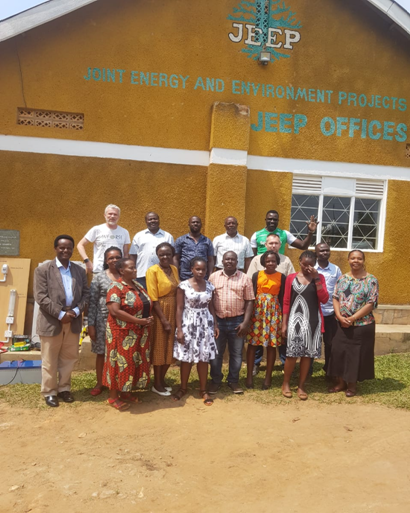East African Civil Society for Sustainable Energy & Climate Action (EASE&CA) project
- Category: Projects
- Published: Friday, 10 April 2020 04:05
- Written by Webmaster
- Hits: 1564
Globally about 840 million people are still without access to electricity. Sub-Saharan Africa remains the region with the largest energy access deficit, with 573 million lacking access to electricity(Tracking SDG7, Energy Progress Report, 2019).A projected 650 million people are likely to remain without access to electricity in 2030, and 9 out of 10 such people will be in Sub-Saharan Africa. SDG target 7.1 calls for universal access to affordable, reliable, and modern energy services. Reliability and affordability remain challenging elements in many countries, even as the number of household connections increases.
The East African region is characterized by very low access to cleaner and sustainable energy services. Over 70% of East Africa’s population lives without access to sustainable energy.
The need to develop pathways and set achievable if ambitious milestones towards SDG7 has become more urgent in the wake of the IPCC 1.5°C Report of October 2018. Achieving net zero carbon economies by mid-century is feasibleand SDG 7 is a fundamental building block in the energy systems needed to ensure inclusive economies that are clean.
 Increasing access to sustainable energy services can contribute to achieving the SDG7 and have a multiplier effect on health, education, transport, telecommunication, safe water and sanitation services. This can contribute to poverty alleviation, providing modern improved energy services and income opportunities to the poor. This is particularly true of decentralized small-scale renewable energy technologies. Such systems can not only provide energy that is affordable to the poor, but can also be a source of employment and enterprise creation. They are conducive for engaging the local communities to participate and take an active role in their development.
Increasing access to sustainable energy services can contribute to achieving the SDG7 and have a multiplier effect on health, education, transport, telecommunication, safe water and sanitation services. This can contribute to poverty alleviation, providing modern improved energy services and income opportunities to the poor. This is particularly true of decentralized small-scale renewable energy technologies. Such systems can not only provide energy that is affordable to the poor, but can also be a source of employment and enterprise creation. They are conducive for engaging the local communities to participate and take an active role in their development.
The Tanzania Traditional Energy Development Organization (TaTEDO) in partnership with Uganda Coalition for Sustainable Development (UCSD), Sustainable Environmental Development Watch Kenya (SusWatch Kenya), Joint Energy and Environment Projects (JEEP) of Uganda, International Network for Sustainable Energy (INFORSE) and Nordic Folkecenter for Renewable Energy (NFRE) of Denmarklaunched a three-year project (July 2019 – July 2022) named “East African Civil Society for Sustainable Energy & Climate Action (EASE&CA)” which is funded bythe Danish Ministry of Foreign Affairs through the CISU Fund for Climate and Environment.
The EASE-CA Project seeks to increase access to sustainable energy and other climate solutions to local communities in Uganda, Kenya and Tanzania with full and effective participation of women and men. Increasing access to sustainable energy will contribute to achieving the SGD7 and have a multiplier effects on health, education, transport, telecommunication, safe water and sanitation services. Increased use of sustainable energy for consumptive and productive purposes coupled with landscape restoration and afforestation will contribute to the global efforts to mitigate and adapt to climate change at the same time brings about socio-economic development in the region. The project primarily works towards Sustainable Development Goal (SDG) 1 (poverty), SDG5 (gender), SDG7 (clean energy), SDG 13 (climate action), and SDG 17 (partnerships).
A kick off meeting for the EASE-CA Project was held at JEEP Folkecenter (Kyanja) in Kampala, July 22 – 26, 2019 where representatives from the six implementing organizations were all represented. The EASE-CA Project will combine activities on local, national and international levels in ways, where they reinforce each other.
At the local level, JEEP will work in 3 districts (Kiryandongo, Nebbi and Nakasongola) in Uganda to empower poor rural communities to increase access to clean energy and energy efficiency; and improved livelihoods in an economic and climate friendly way. Seminars, trainings are planned that will reach out to rural households, trainers, local leaders, planners. Themes include: clean cooking, water, food security, tree planting, solar energy, sustainable energy & development, income generation to reduce poverty through green entrepreneurship initiatives, among others.
At the national level, TaTEDO,SusWatchand UCSD will strengthen Civil Society Organizations’ activities in Tanzania, Kenya and Uganda through CSO Coalition meetings, discuss and agree on joint policy recommendations, make presentations to policyand decision-makers, and hold dialogues with stakeholders, as well as media campaigns.
At the International level, advocacy by the project partners seeks to strengthen networking and CSOs participation, exchange of experiences and to give voice to participating CSOs at United Nations Climate Negotiations (UNFCCC).
Read more about the Project Partners visit: http://www.inforse.org, www.jeepfolkecenter.org, www.ugandacoalition.or.ug, www.suswatchkenya.org, www.folkecenter.net

